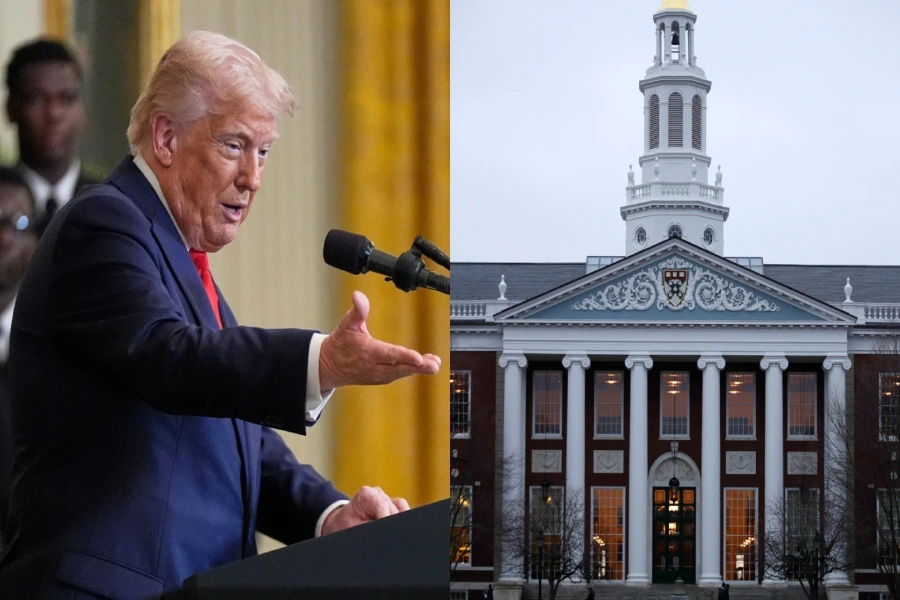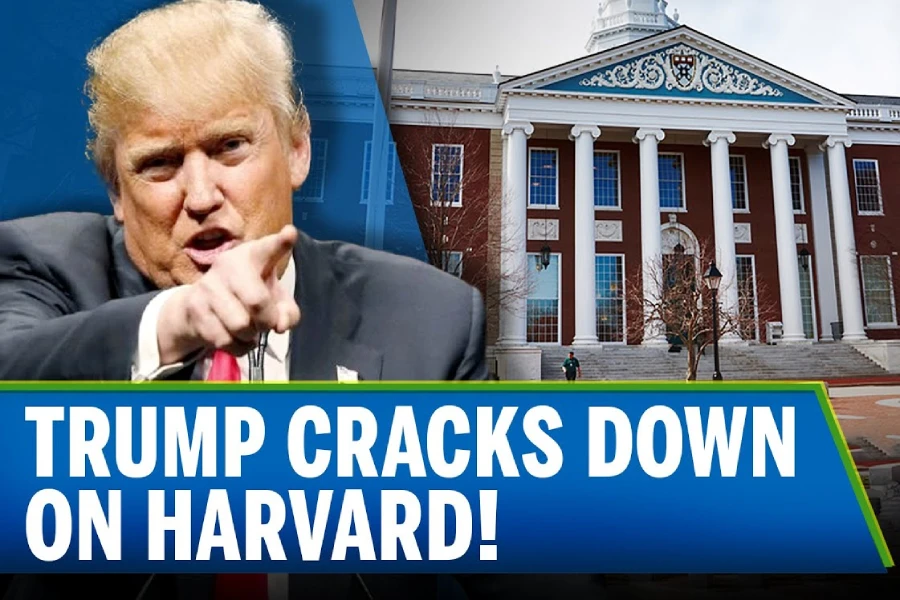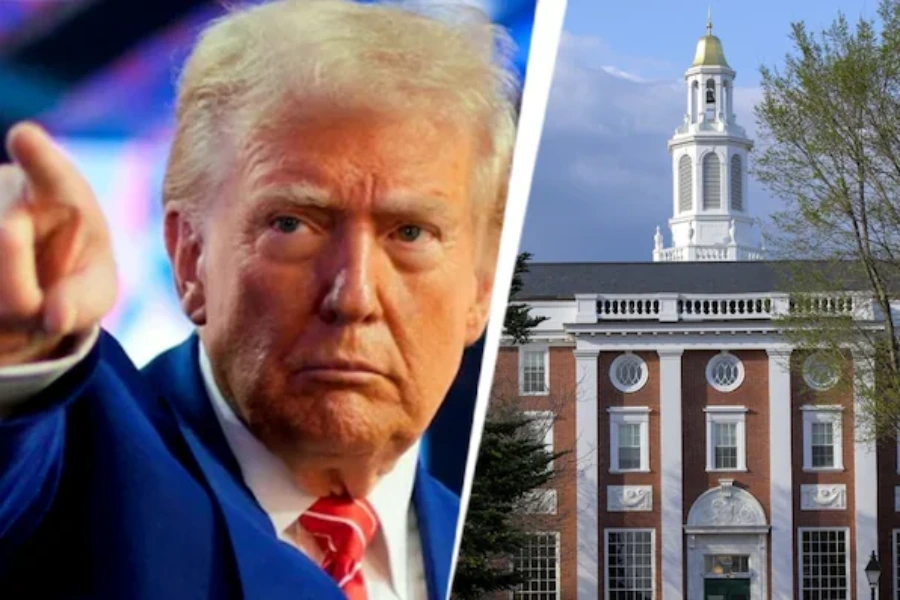In a move that has sent shockwaves through the academic and legal world, the Trump administration has revoked Harvard University’s ability to enroll international students, citing national security concerns and alleged noncompliance with data-sharing requests. The decision, made public by the Department of Homeland Security (DHS), affects over 6,800 foreign students—nearly 27% of Harvard’s student body—and raises serious legal, ethical, and financial questions. This development not only impacts the future of Harvard international students but also sets a powerful precedent for higher education institutions across the United States.

What Happened?
The Student and Exchange Visitor Program (SEVP) certification, which allows U.S. schools to sponsor visas for foreign students, was revoked by DHS under Secretary Kristi Noem. The official rationale was Harvard’s failure to comply with a federal request tied to an investigation into allegations of a “hostile environment for Jewish students.” The DHS demanded detailed academic and background records for numerous international students. Harvard, citing legal overreach and privacy concerns, partially complied—but that was not enough.
The DHS’s response was swift: immediate termination of SEVP certification and a public statement saying that current students must transfer or face loss of legal status.
Legal Implications and Analysis
1. Due Process and Regulatory Grounds
The revocation of SEVP certification typically occurs after prolonged noncompliance or serious violations, such as visa fraud. In this case, Harvard asserts that it met all federal requirements and that the move is both unlawful and retaliatory. Legal scholars argue that DHS may have bypassed administrative due process.
According to immigration attorney Lisa Kapoor:
“Revoking a university’s SEVP status based on an ongoing, unresolved investigation—especially one rooted in ambiguous allegations—sets a concerning legal precedent.”
If Harvard challenges the action in court, it will likely invoke the Administrative Procedure Act (APA) and claim violations of the Fifth Amendment’s due process clause. Precedents such as Harvard v. DHS (2020), in which the university successfully blocked a rule targeting online international students, may support its case.
2. Impact on International Students’ Visa Status
Without SEVP certification, Harvard cannot issue new I-20 forms—a required document for obtaining or maintaining an F-1 student visa. This forces thousands of current international students into legal limbo. They must either transfer within days, return home, or risk becoming “out of status,” a condition that could jeopardize future visa eligibility.

Financial Fallout for Harvard
The consequences are not just legal—they’re deeply financial. International students contribute an estimated $591 million annually to Harvard in tuition, housing, and other expenses. With annual tuition nearing $87,000 per student, this sudden cut could slash revenues by hundreds of millions.
Furthermore, international students enrich the academic environment by contributing diverse perspectives, research, and global partnerships. Losing this demographic significantly affects Harvard’s global standing and operational model.
Political Context: A Pattern of Targeting Elite Institutions
This isn’t the first clash between the Trump administration and elite universities. From disputes over affirmative action to investigations into Chinese research ties, the White House has repeatedly challenged what it views as “liberal, unaccountable” academia.
Critics, including former DHS officials, see this latest move as ideologically driven.
Andrea Flores, a former immigration policy advisor under Obama, stated:
“This isn’t about compliance; it’s about control. The administration is using immigration law to punish perceived political opponents.”
Harvard’s Response and Future Legal Action
Harvard’s leadership, including President Alan Garber, has issued a firm statement rejecting the DHS’s action as baseless and retaliatory. The university has already assembled a legal team and is expected to seek emergency relief in federal court, possibly via a temporary restraining order (TRO) to block implementation.
Meanwhile, students, faculty, and alumni have mobilized in protest. Hashtags like #ProtectIntlStudents and #HandsOffHarvard are trending, and pressure is mounting on lawmakers to intervene.
Broader Implications for U.S. Higher Education
The decision to revoke Harvard’s SEVP certification signals a broader threat to international education in the U.S. Institutions like MIT, Stanford, and Yale fear similar actions.
Key Risks:
-
Decline in international applications
-
Reduced cultural and academic diversity
-
Long-term damage to U.S. educational reputation
-
Fueling student migration to Canada, the UK, or Australia
The American Council on Education has called for immediate congressional oversight, warning that such actions will erode the U.S.’s status as the top global destination for higher education.
Voices from the Ground
Leo Gerden, a Swedish senior at Harvard, encapsulated the anxiety shared by many:
“We came here believing in the American dream, in open campuses and free ideas. Now we’re being treated like bargaining chips in a political fight.”
Conclusion
The Trump administration’s revocation of Harvard’s ability to host international students marks a historic—and contentious—moment in the evolution of U.S. immigration and education policy. Legal battles are imminent, financial losses are mounting, and the future of thousands of students hangs in the balance.
More than just a university story, this development reflects the ongoing tug-of-war between federal power and academic independence—and the deepening politicization of international education.
FAQs
-
Why did the Trump administration ban Harvard from enrolling international students?
The ban followed a dispute over data requests related to an investigation into alleged antisemitism on campus. -
Can international students still attend Harvard in 2025?
No, unless the decision is overturned legally, international students must transfer or leave the U.S. -
How many international students are affected by the SEVP revocation at Harvard?
Around 6,800 students, making up 27% of Harvard’s enrollment. -
Is Harvard suing the U.S. government over this decision?
Yes, legal action is being considered and likely to be filed soon. -
What is SEVP and why is it important?
SEVP allows U.S. schools to enroll international students and issue I-20 forms for F-1 visas. -
What are the financial impacts of this on Harvard?
Potential losses exceed $500 million annually from international tuition. -
Has this ever happened to another Ivy League school?
No, this is an unprecedented move targeting a top-tier U.S. university.

